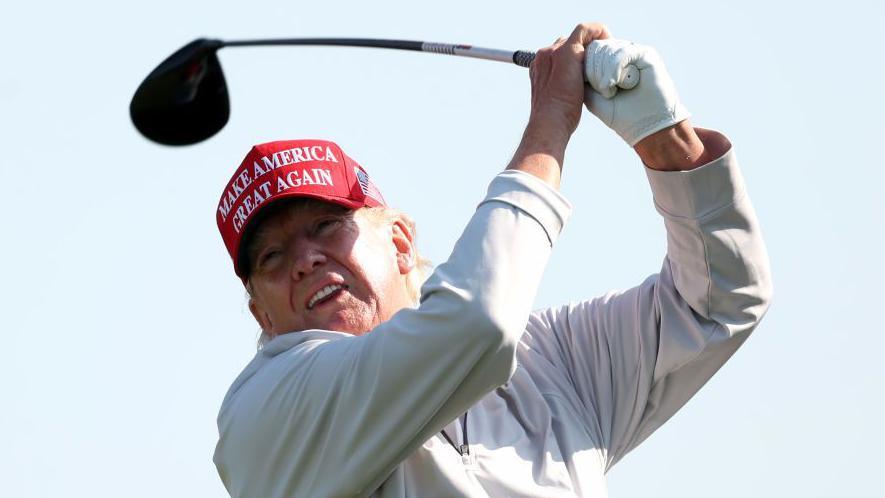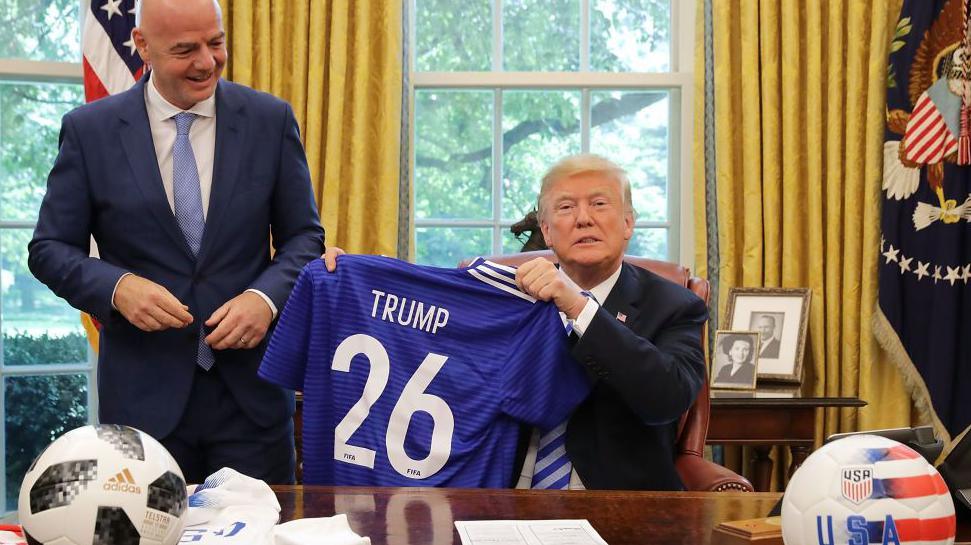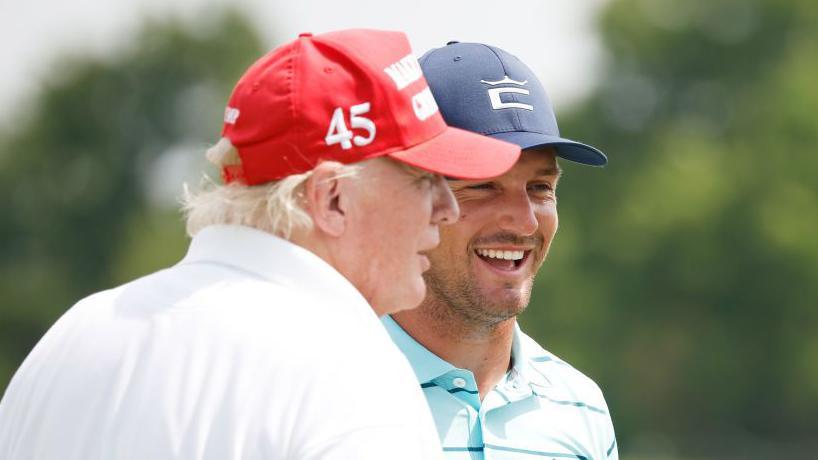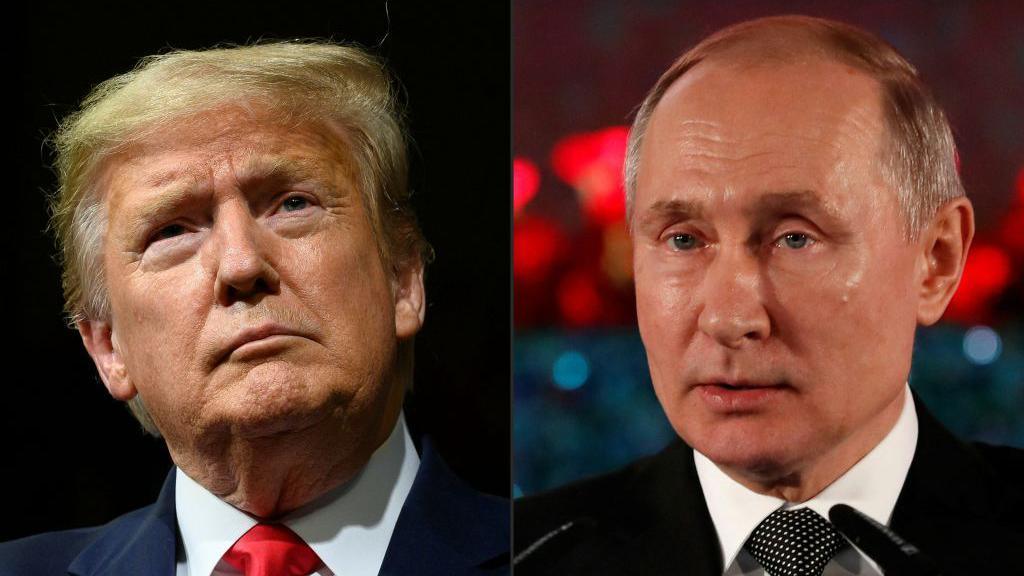What impact could Trump's return have on sport?

Donald Trump is a keen golfer and owner of many courses
- Published
Sporting personalities featured prominently in the immediate aftermath of Donald Trump's re-election as the president of the United States, with golfer Bryson DeChambeau and UFC president Dana White making appearances on stage during his victory speech in Florida on Wednesday.
It was a reminder of the new president's sporting connections before a second term during which his country will host the football World Cup in 2026 and the Olympics in 2028 - with Trump set to be a highly visible presence at both.
So, what impact could some of his policies have on the sporting landscape?
Will immigration rules impact football?
Trump has promised the mass deportation of undocumented migrants, and to complete the building of a wall along the country's southern border that was started during his first presidency.
Such policies are set to heighten diplomatic tensions with Mexico, a fellow co-host of the 2026 World Cup (alongside Canada) and could lead to concerns among fans about travelling between the two countries.
During his first term in office, there were fears Trump's immigration policies, including a travel ban for certain countries, could cost the US the right to host the tournament for the second time.
Trump recently vowed to reinstate the travel ban that barred people from predominantly Muslim countries. However, he had previously reassured Fifa that fans of qualified teams would be allowed entry into the US, and the governing body's president Gianni Infantino - who is known to be close to Trump - seemed pleased by his return to the White House.
The US is of crucial importance to Infantino, as it is also hosting the first edition of his controversial, newly-expanded 32-team Club World Cup in 2025. Intended to generate significant funds, it has struggled to attract commercial and media interest, and has led to legal action from the global players' union.
The US will celebrate its 250th birthday during the 2026 World Cup, commemorating the signing of the Declaration of Independence in 1776, and handing the president even more global spotlight.
It will soon become clear whether some of his more divisive and inflammatory rhetoric about immigrants makes some businesses think twice about sponsoring the event for fear of being associated with the president.

Infantino (pictured left, with Trump in 2018) congratulated him this week, saying: "We will have a great Fifa World Cup and a great Fifa Club World Cup in the United States of America! Soccer unites the world"
How would Trump’s promise of mass deportations of migrants work?
- Attribution
- Published18 November 2024
Seven things Trump says he will do as president
- Attribution
- Published6 November 2024
Women's sport and inclusion
Trump has vowed to ban all transgender women from female competition in sports, and has regularly focused on the issue during his election campaign, including in TV adverts that criticised transgender athletes and which were shown during sports broadcasts.
He has previously condemned trans-inclusive teams, arguing it threatens women's sports.
Trump's rhetoric could please those concerned about the impact of transgender inclusion on fairness and safety in female competition. But with the 2028 Games set to take place in Los Angeles, others fear it could also put him at loggerheads with the International Olympic Committee (IOC), which has allowed individual sports to choose their own gender eligibility policies.
Trump has also mocked Olympic women's boxing champion Imane Khelif, who won gold at Paris 2024 a year after being disqualified from the World Championships for reportedly failing gender eligibility tests.
In Republican party campaign videos in the days before the US election, Trump questioned the fighter's biological sex, using it as an example of how he claimed "speaking the truth" had become "hate speech" under Joe Biden's government.
Algerian Khelif and her Olympic association have always said she was born a woman and is a woman.
The IOC has condemned the "abuse" Khelif has received, blaming "prejudices and culture wars", saying the fighter is eligible to fight in women's boxing.
It will also be interesting to see if plans for the Olympics are affected if there is a repeat of the friction seen in the past between Trump and some Democrat politicians who hold powerful positions in California.
There could also be tension with the Paralympic community before LA 2028, with Trump having previously denied accusations he mocked a disabled reporter with a congenital joint condition at a rally in 2015. Three years later he was also rebuked by the International Paralympic Committee for saying the Pyeongchang Paralympics was "hard to watch".
IOC says Khelif preparing legal action after new eligibility claims
- Published6 November 2024
What does science tell us about boxing’s gender row?
- Attribution
- Published9 August 2024
What are the human rights concerns?
One of the main themes of the sporting landscape over the past decade has been allegations of 'sportswashing' amid unprecedented investment, hosting and sponsorship by Middle Eastern states.
Countries such as Qatar and Saudi Arabia have repeatedly denied accusations they are using sport to distract from their authoritarian regimes' human rights violations, and have accused Western critics of hypocrisy.
Could that argument gain traction after the return to the White House of Trump - a convicted felon described by his rivals as a "fascist" and a threat to democracy?
Sports bodies may now face uncomfortable questions about taking their flagship events to a country where the constitutional right to abortion was overturned in 2022 by the Supreme Court, which had a majority of conservative judges following Trump's first presidency.
There have also been more than 600 mass shootings in the US for each of the past four years, with Trump supportive of gun rights.
During the president's first administration, Amnesty International documented "extensive damage to human rights", adding that protecting them in the US "means ending gun violence and guaranteeing adequate healthcare for all, including abortion".
The human rights group has also highlighted that the US had the fifth highest number of executions (24) in the world last year. Saudi Arabia was third highest with 172 executions.
Fifa says it is "fully committed" to upholding human rights when staging tournaments. But amid scrutiny of the implications of both Qatar's hosting of the 2022 World Cup and Saudi's unopposed bid to stage the 2034 event, Trump's victory could mean the 2026 tournament now comes under renewed focus too.
A 'peace deal' for golf?

Two-time US Open champion Bryson DeChambeau (right) was on stage for Donald Trump's victory speech
With the US PGA tour involved in protracted negotiations with the Saudi Public Investment Fund (PIF) over a potential merger aimed at healing a split in men's professional golf over the breakaway LIV circuit, Rory McIlroy believes Trump could help bring an end to the deadlock.
A proposed deal is likely to face opposition from the Department of Justice, which has concerns over a possible breach of anti-competition laws, but Trump has suggested he could end golf's "civil war", which has resulted in many leading stars being banned from the PGA Tour.
Trump has praised the lucrative LIV tour, and five of its tournaments have been been held at his courses since its inception in June 2022.
He has close ties with Saudi Arabia, and has also played golf with PIF governor Yasir Al-Rumayyan, who could become tour chairman if the reported £1bn 'peace deal' is approved.
Under Trump, Saudi influence over golf looks set to grow.
The other sport to feature during Trump's victory speech was UFC, with its president White invited to make his own address on the stage.
Having Trump as an ally could benefit the UFC as it continues to face legal challenges to the way it operates. This year TKO Group, which owns the UFC, agreed a £281m settlement with former fighters who claimed the MMA promotion suppressed athletes' abilities to negotiate other promotional options.
What might be the impact of foreign and trade policy?

Vladimir Putin (right) called Donald Trump a "courageous man" when congratulating him on his election victory
Trump has been accused by his opponents of cosying up to President Vladimir Putin. With Russia currently in sporting exile because of its invasion of Ukraine, some are asking whether he could put pressure on bodies such as the IOC to end their ban and readmit Russian competitors.
Trump has also vowed to broker a peace deal between Russia and Ukraine, and if that could be achieved it could lead to Russia's return to the international sporting fold.
Trump has also proposed new tariffs of at least 10% on most foreign goods, to cut the trade deficit. Imports from China could bear an additional 60% tariff, he has said.
Such trade barriers and any potential retaliatory tariffs could be unhelpful to sports leagues such as the NBA, which is trying to grow its business globally and is keen on staging games in China again, among other countries.
Trump’s protectionist trade policy could be awkward for Fifa, which recently secured Chinese consumer electronics manufacturer Hisense as the first official partner for next year's Club World Cup.
Could tariffs on imports also make it harder for the IOC to find sponsors for the Olympics?
Will US sport be politicised again?
In Trump's first term, sport and politics regularly clashed in the US, with his presidency appearing to spark a new era of intensifying athlete activism.
In 2017 he was highly critical of the NFL and players who kneeled during the traditional pre-match national anthem in a protest against racial injustice and police brutality towards African-Americans, a movement started by former San Francisco 49ers quarterback Colin Kaepernick.
Trump accused them of a lack of patriotism and clashed with a number of top US sports stars - including NBA legends LeBron James and Stephen Curry, and footballer Megan Rapinoe - with some teams rejecting invitations to the White House in protest at his policies.
Basketball coach Steve Kerr emerged as a prominent voice of protest against Trump's suspension of the US refugee programme.
In 2020, several top stars - including James - launched a campaign designed to encourage more people from black communities to have their say in the presidential election, which Trump narrowly lost.
The 2024 election campaign saw both presidential candidates receive the support of a host of sporting figures. It would be little surprise if US sport is politicised once again, and if more athletes use their platforms to speak out on a host of social issues, now Trump is back in the White House.
However, it is also worth noting 95% of the tens of millions of dollars donated by sports team owners in the major US professional leagues in recent years reportedly went to Republican campaigns, candidates and committees, external.
That suggests those in charge of domestic sport are largely content with Trump, and that it may be the major international sporting events the US is due to stage over the coming years where the biggest impact of his return could be felt.